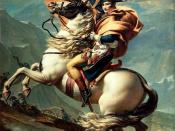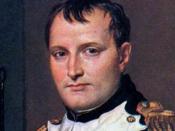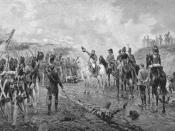�PAGE � �PAGE �1�
The Battle of Waterloo was one of history's most memorable battles. This battle defeated Napoleon, one of the most powerful leaders in Europe at the time. The Battle of Waterloo was fought between the Duke of Wellington and Napoleon on June 18, 1815. Napoleon's loss at Waterloo was due to the fighting conditions, the leadership and allies on both sides, and inferior battle tactics.
The fighting conditions of Waterloo were not what a commander would have wanted. The ground was soggy, soft, and wet from the rain the night before. Wellington's allies, the Prussians, arrived late to the battle. The soft ground made it harder for them to move the eight miles to get to Waterloo. The Prussians had wagons full of guns and ammunition and cannons. The soft, muddy ground made these wagons hard to move, so the Prussians had to move all the equipment by hand.
The rain from the night before not only affected the ground on which the battle was fought, but it also affected the decisions of the commanders. Napoleon had to delay an attack for two hours so that the land would become more firm. He wanted the ground to be firm so the cannon balls would have their maximum effect (Crompton, "Napoleon Strikes"1). Weather was not the only thing that affected the battle, for weapons and how they were used helped to win the battle.
Probably the most important and basic part of Napoleon's army was the infantryman with his musket. There was very little variety in musket design at this time in history. Wellington's and Napoleon's men used the same type of musket. All of the muskets were loaded through the muzzle. A good infantryman could shoot three or four times per minute (Haythornthwaite 71). The foot soldiers...


